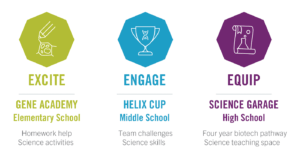Mentoring: a relationship in which an experienced person assists another in developing specific skills and knowledge to enhance the less-experienced person’s professional and personal growth.
January is National Mentoring Month. STEM Ecosystems build bridges between schools and their communities and put strong mentoring programs in place. This helps students with their education and gives them an understanding of what careers are actually like.
In Texas, the Greater Austin STEM Ecosyste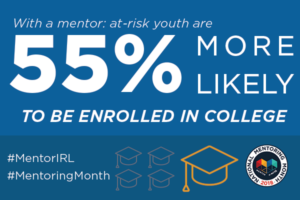 m is making it easy for STEM professionals to connect with K-20 educators, classrooms, out of school time programs, and other volunteer opportunities. Professionals can share their skills and expertise to bring real-world, authentic learning opportunities to all students helping to create the next generation of innovators. Through in-person matches and virtual sessions, professionals can help educators and program providers connect their students to the world of STEM.
m is making it easy for STEM professionals to connect with K-20 educators, classrooms, out of school time programs, and other volunteer opportunities. Professionals can share their skills and expertise to bring real-world, authentic learning opportunities to all students helping to create the next generation of innovators. Through in-person matches and virtual sessions, professionals can help educators and program providers connect their students to the world of STEM.
The Texas STEM Connections Web Portal makes connections between STEM volunteers and in-person or virtual STEM volunteer opportunities across the Greater Austin area and all of Texas. Texas STEM Connections on the Nepris platform is a collaboration led by the Texas Girls Collaborative Project and supported by many organizations interested in creating meaningful STEM connections and role model interactions for students including: Texas Partnership for Out of School Time, Informal Science Education Association of Texas, Greater Austin STEM Ecosystem, Central Texas Discover Engineering, The University of Texas at Austin K12 STEM Collaborative, and The University of Texas at Austin Women in Engineering Program.
ExpandED Schools, a member of the NYC STEM Education Network (@NYCSTEMNetwork, an affiliate of the STEM Learning Ecosystems Initiative), is piloting “Early Risers,” a pre-service practicum experience in early childhood STEM through funding from 100Kin10. Aiming to boost teacher workforce diversity, this program provides Fellows in the Pathways Fellowship (primarily men of color) with support, professional development, and weekly one-on-one mentoring with current teachers in NYC.
Following profe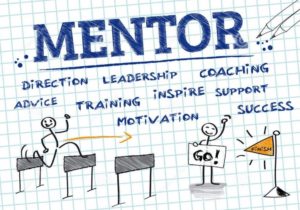 ssional development with ExpandED Schools and its partner, The Lawrence Hall of Science, on the Amplify Science curriculum, Fellows provide 2 hours weekly of STEM instruction to 2nd and 3rd grade students, one hour of which is observed and/or co-taught by the Fellow’s mentor. An additional hour weekly of one-on-one mentoring means that Fellows and mentors have meaningful, on-going, and consistent conversations about pedagogy, student learning, instructional decisions, and career development. The program is still in its first year of implementation, but based on preliminary data collected, both mentors and mentees are reporting high levels of enjoyment and closeness in the mentoring relationship.
ssional development with ExpandED Schools and its partner, The Lawrence Hall of Science, on the Amplify Science curriculum, Fellows provide 2 hours weekly of STEM instruction to 2nd and 3rd grade students, one hour of which is observed and/or co-taught by the Fellow’s mentor. An additional hour weekly of one-on-one mentoring means that Fellows and mentors have meaningful, on-going, and consistent conversations about pedagogy, student learning, instructional decisions, and career development. The program is still in its first year of implementation, but based on preliminary data collected, both mentors and mentees are reporting high levels of enjoyment and closeness in the mentoring relationship.
In California, OC STEM hosts a Community College Summer Bridge Program. The 2017 Summer Bridge Program, held at UC Irvine, had a total of 19 participants who were engineering or information and computer sciences majors who were transferring from Irvine Valley College, Saddleback College or 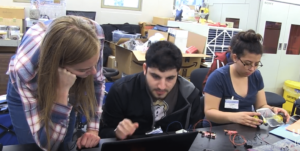 Santa Ana College. The week long program, facilitated and staffed by undergraduate “peer mentors” who are current Junior and Senior level Engineering and ICS students at UC Irvine, allowed Bridge participants to make connections and build relationships before courses begin in the fall quarter. The summer bridge also served to orient transfer students to their chosen major, as well as expose them to the full breadth of the disciplines and other majors.
Santa Ana College. The week long program, facilitated and staffed by undergraduate “peer mentors” who are current Junior and Senior level Engineering and ICS students at UC Irvine, allowed Bridge participants to make connections and build relationships before courses begin in the fall quarter. The summer bridge also served to orient transfer students to their chosen major, as well as expose them to the full breadth of the disciplines and other majors.
Over the course of the week students participated in workshops and received instruction in computer aided design, circuit building, micro controllers, coding and programming. Participants were broken into interdisciplinary teams and given a “tech sandbox” and asked to design, fabricate, and program an autonomous vehicle that would travel over a specified path. A soccer ball was placed somewhere along the path and the soccerbot had to detect and kick the ball into the goal. Additionally participants were trained and certified to utilize machines in the FABWorks and RapidTech facilities. The program emphasized and reinforced skills (i.e. time management, team building, entrepreneurship, accessing campus support structures) critical to making a successful transition from community college to UC Irvine. Click here to view a highlight video.
Also coordinated by OC STEM, the FABcamp program enables 6th-9th grade students to gain hands-on experience in the major disciplines in the field of engineering. Participants spend one week at UC Irvine exploring the life of a college student. They cultivate new friendships with students not from their school, or even their district, and interact with current college students. FABcamp utilizes undergraduate engineering students as peer mentors who serve as role-models and provide campers insight into what college and academic life is like, while also developing their own leadership and project management skills.
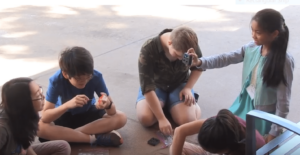 The FABcamp series content ranges from discipline specific engineering design challenges (3D modeling, rapid prototyping and fabrication technologies) to basic coding and programming using Raspberry Pi and Arduino, to creating the The Internet of Things. The final FABcamp is a High School Internship Program for students who completed the FABcamp series. In addition to a rigorous focus on STEM concepts, a formal “leadership development” component expands students’ skill sets in Communication, Collaboration, Critical Thinking, and Creativity. The interns relate well to the middle school participants as they navigate through their own experiences. A key element for the interns is that not only are they acting as mentors for the participants, they are also mentees under the guidance of undergraduate and professional staff.
The FABcamp series content ranges from discipline specific engineering design challenges (3D modeling, rapid prototyping and fabrication technologies) to basic coding and programming using Raspberry Pi and Arduino, to creating the The Internet of Things. The final FABcamp is a High School Internship Program for students who completed the FABcamp series. In addition to a rigorous focus on STEM concepts, a formal “leadership development” component expands students’ skill sets in Communication, Collaboration, Critical Thinking, and Creativity. The interns relate well to the middle school participants as they navigate through their own experiences. A key element for the interns is that not only are they acting as mentors for the participants, they are also mentees under the guidance of undergraduate and professional staff.
The Bay Area STEM Ecosystem, also located in California, partners with Genentech on Futurelab. This hyper-local, award-winning program gives K-12 students the opportunity to get excited to learn about science, to equip and engage them in hands-on experiments, and to inspire them to pursue STEM-related careers. Futurelab consists of three specific programs for students of different ages.
Gene Academy, an after-school mentoring program for kids in third through fifth grade, pairs kids with volunteer mentors at Genentech to work together on homework and hands-on science projects for an entire academic year. Helix Cup is an annual science competition designed to engage all eighth grade students from SSF middle schools to help them develop problem solving, teamwork and science skills. Students teams are matched with volunteer coaches who help guide them through design challenges. Science Garage is a classroom and lab that through a four-year biotech pathway, will give all high school students in the district the chance to explore the exciting field of biotechnology and increase their awareness of careers in biotech. Classrooms are matched with volunteer Teacher Assistants to help them master lab techniques and translate what they’re learning intoto real-world context.
Genentech employee involvement is an integral part of Futurelab, as research has shown students engaged with STEM professionals have more confidence in their capabilities and greater knowledge and understanding of potential careers in STEM.
These examples of mentoring programs come from just four of the 56 STEM Learning Ecosystems. It’s easy to see that the Ecosystems truly are making connections that benefit young people with hands-on education and mentoring.
What’s happening in your community? Share examples of your local mentoring programs by tweeting to @STEMEcosystems.

